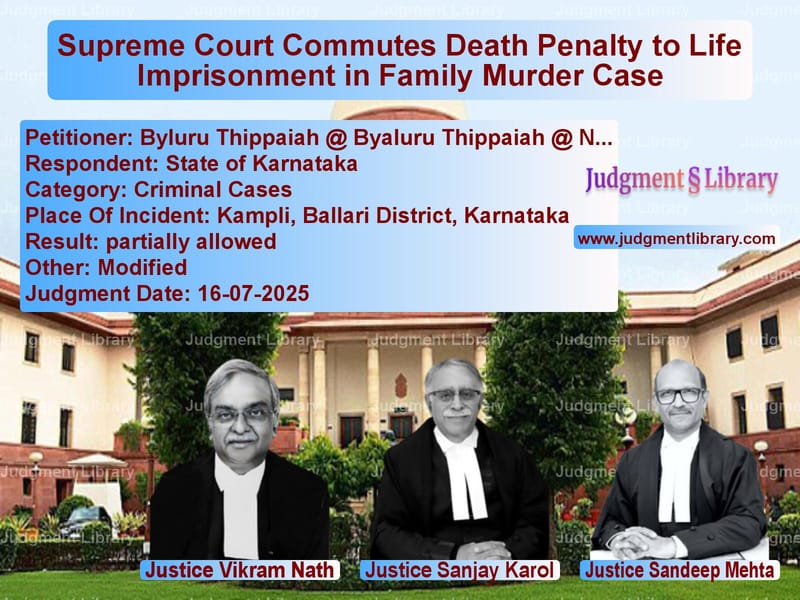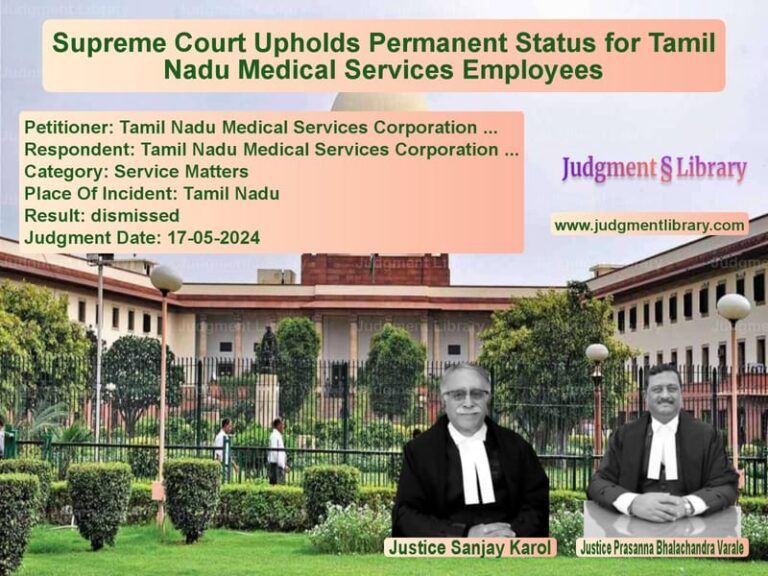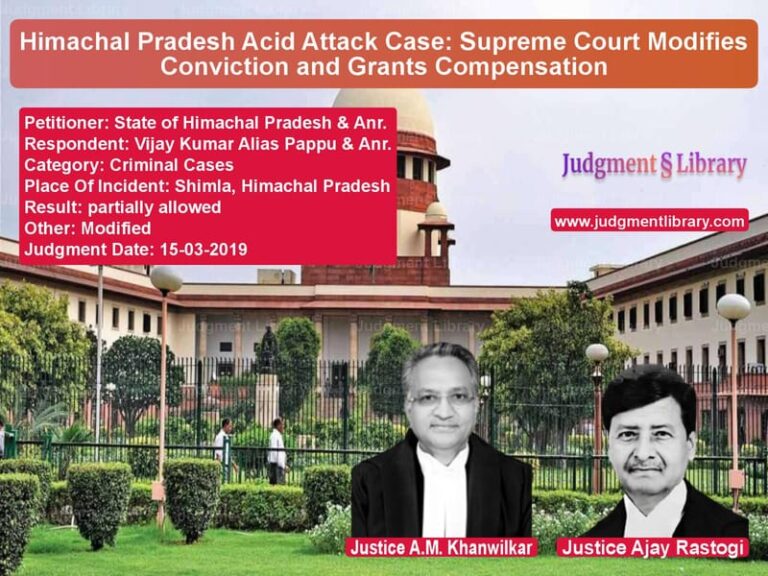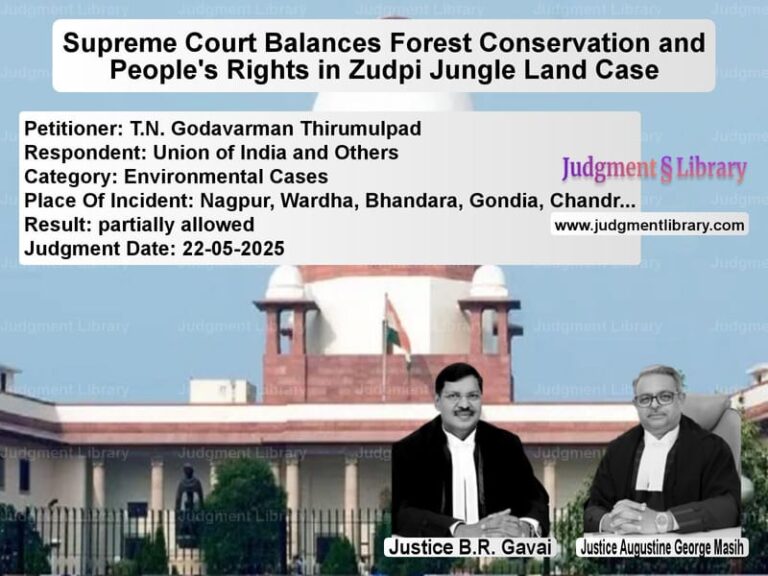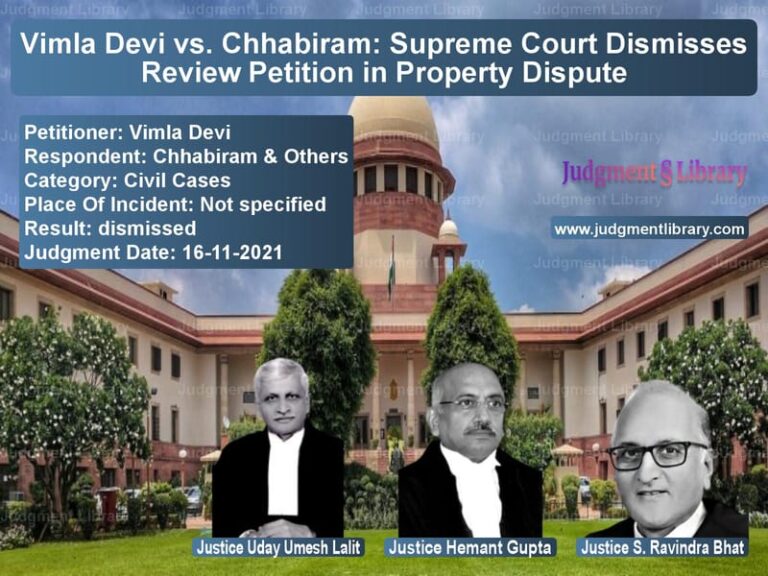Supreme Court Commutes Death Penalty to Life Imprisonment in Family Murder Case
In a deeply disturbing case that shocked the conscience of society, the Supreme Court of India recently delivered a landmark judgment that balanced the heinous nature of a quintuple murder against the principles of reformation and the right to life. The case involved Byluru Thippaiah, a man who brutally murdered his wife, sister-in-law, and three young children based on unfounded suspicions of infidelity. While the Court upheld his conviction for the barbaric killings, it commuted the death sentence to life imprisonment without remission, marking a significant moment in India’s evolving jurisprudence on capital punishment.
The tragic events unfolded on February 25, 2017, in Karnataka’s Ballari district. Thippaiah, driven by baseless suspicions about his wife Pakkeeramma’s fidelity and doubts about the paternity of their three children, launched a brutal attack that would claim five lives. The victims included his wife Pakkeeramma, her sister Gangamma, and three children – Pavithra, Nagraj, and Basamma – aged just six, seven, and eight years old.
The prosecution’s case revealed chilling details of premeditation. Thippaiah had sent his daughter Rajeshwari away before the murders, demonstrating clear planning. Multiple witnesses testified that after committing the murders, Thippaiah emerged from his house holding a blood-stained chopper and openly declared his actions to neighbors. As the Supreme Court noted, “He suspected that his three-children namely Pavithra, Nagraj @Rajappa and Basamma born to D-1 were perhaps not his own.”
The trial court had described the crime scene as resembling “a rustic butcher shop” and noted that the accused had “chopped off his wife, sister-in-law and 03 helpless children in a barbaric way, that too in a diabolical and dastardly manner one after the other.” The court imposed capital punishment, stating that “this case squarely fall within the rarest of the rare category.”
The High Court confirmed both the conviction and death sentence, observing that Thippaiah appeared to have “no regard for law” and that the gruesome manner of commission was an aggravating circumstance. The court ordered that “the Appellant shall be hung by his neck till death.”
Before the Supreme Court, Mr. Gopal Sankaranarayanan, learned Senior Counsel appeared for the appellant, while Mr. Avishkar Singhvi, learned Additional Advocate General represented the State of Karnataka. The prosecution presented overwhelming evidence, including testimonies from multiple eyewitnesses who saw Thippaiah with the blood-stained weapon and heard his confession.
PW-16 deposed: “At about 8.00 p.m. the accused came out of his house holding a chopper, which was blood stained, his clothes were also stained with blood. I have enquired him about the blood stains, he reported that he chopped off five person and abused them as prostitutes.”
PW-11 testified: “On the date of incident i.e. 25.02.2017 I saw the accused holding M.O-1 chopper in his hand. He was coming out of his house holding M.O-1. It was fully blood stained. Accused was abusing his wife and declaring that he had killed them.”
The Supreme Court, comprising Justices Vikram Nath, Sanjay Karol, and Sandeep Mehta, carefully examined the evidence and sentencing considerations. While upholding the conviction, the Court made significant observations about the death penalty jurisprudence in India.
The Court referenced the landmark case of Bachan Singh v. State of Punjab, which established the “rarest of rare” doctrine for imposing capital punishment. More recently, in Manoj v. State of M.P., the Court had emphasized the need for comprehensive sentencing considerations, including psychiatric evaluation and social background of the accused.
The Supreme Court noted that “the High Court did, in accordance with Manoj (supra), call for the reports. However, we are of the considered view, that the said reports have not been considered to their full extent.”
The mitigation reports revealed crucial factors in Thippaiah’s favor: he had no criminal antecedents, showed “good moral character” and “good conduct” in prison, and had attempted to improve himself by participating in literacy programs. The psychological evaluation indicated he had experienced mental health struggles and had attempted suicide twice.
The Court observed: “The Probation Report reveals that the Appellant-convict has no antecedents; there is mixed opinion on whether he is suitable for reformation or not. The ‘Conduct and Behavioural Report’ submitted by the Government of Karnataka, Prisons and Correctional Services records that he has ‘good moral character’ and ‘good conduct’ with co-prisoners and prison officials.”
Regarding the possibility of reformation, the Court noted: “Given there is mixed opinion on whether he shall or shall not be able to reform his way, the Court will err on the side of caution just as when there are two possible interpretations of a given set of facts or circumstances, the one that favours the accused is to be adopted.”
The Court also considered the impact on Thippaiah’s surviving daughter Rajeshwari, who was experiencing psychological difficulties due to the trauma. The reports indicated that “the Appellant-convict’s continued incarceration has had a negative impact on Rajeshwari, who is really struggling to cope with life.”
In its final analysis, the Supreme Court stated: “While we affirm the findings of the Courts below regarding the Appellant-convict’s conviction for the barbaric and ruthless murders of his family members, D-1 to D-5. However, on the aspect of sentencing, we hold that despite having considerable information before it, the High Court did not consider it appropriately and sufficiently, in view of the findings recorded in the said reports.”
The Court concluded: “Considering the sum-total of circumstances that drove the Appellant-convict to this point of committing this crime of a most reprehensible nature, the death penalty may not be appropriate. We are of the view that he should spend his days in jail attempting to repent for the crimes committed by him. As such, these appeals are partly allowed to the extent that he is released from death row. Instead, he shall await his last breath in prison, without remission.”
This judgment represents a significant development in India’s capital punishment jurisprudence, emphasizing that even in cases involving brutal crimes, the courts must carefully consider all mitigating circumstances, including the possibility of reformation, prison conduct, and the accused’s background. The decision reinforces the principle that the death penalty should be reserved only for cases where there is no possibility of reformation and where the crime shocks the collective conscience of society to such an extent that the only appropriate response is the ultimate punishment.
The Supreme Court’s careful balancing of the heinous nature of the crime against the principles of reformation and the right to life demonstrates the evolving nature of sentencing in Indian criminal jurisprudence. While society demands justice for victims of brutal crimes, the legal system must also uphold the constitutional values of human dignity and the possibility of redemption, even for those who have committed the most terrible acts.
Petitioner Name: Byluru Thippaiah @ Byaluru Thippaiah @ Nayakara Thippaiah.Respondent Name: State of Karnataka.Judgment By: Justice Vikram Nath, Justice Sanjay Karol, Justice Sandeep Mehta.Place Of Incident: Kampli, Ballari District, Karnataka.Judgment Date: 16-07-2025.Result: partially allowed.
Don’t miss out on the full details! Download the complete judgment in PDF format below and gain valuable insights instantly!
Download Judgment: byluru-thippaiah-@-b-vs-state-of-karnataka-supreme-court-of-india-judgment-dated-16-07-2025.pdf
Directly Download Judgment: Directly download this Judgment
See all petitions in Murder Cases
See all petitions in Judgment by Vikram Nath
See all petitions in Judgment by Sanjay Karol
See all petitions in Judgment by Sandeep Mehta
See all petitions in partially allowed
See all petitions in Modified
See all petitions in supreme court of India judgments July 2025
See all petitions in 2025 judgments
See all posts in Criminal Cases Category
See all allowed petitions in Criminal Cases Category
See all Dismissed petitions in Criminal Cases Category
See all partially allowed petitions in Criminal Cases Category

